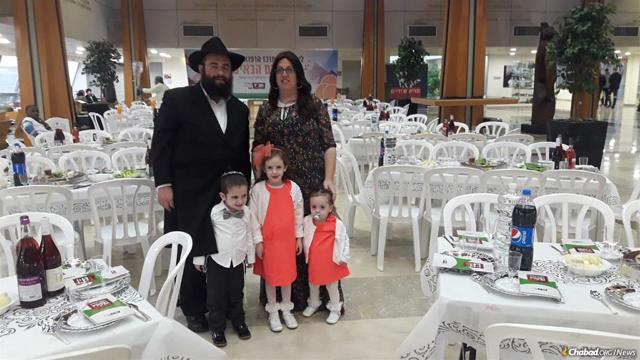
In Israel, Bringing Passover to 3,100 Wounded Soldiers
by Noa Amouyal – chabad.org
For many, the Passover seder conjures up memories of family huddled together, celebrating the Exodus from Egypt. This year in Israel, though, with hundreds of soldiers wounded and in hospitals and 59 hostages still in Palestinian captivity in Gaza, the idea of freedom almost seems like a dream out of reach for some.
To serve them, Chabad-Lubavitch emissaries from across Israel hosted Passover seders in 31 hospitals for 3,100 patients and family members. Many of the hospitalized attendees were soldiers injured in the war in Gaza—some of them critically.
They also assembled and distributed 2,500 Seders-in-a-box, a kit that gives a patient everything they need to observe the Passover holiday, and 17,000 round, handmade shmurah matzahs so every patient is able to carry out the mitzvah of eating the unleavened bread on the night of the Seder.
“There were 100 participants at our seder,” said Rabbi Dovid Zalmanov, a Chabad rabbi at Loewenstein Hospital in Raanana. “It was very emotional.”
Among the soldiers present were some lying unconscious on a gurney, a family member at their side, praying that their condition improves.
And even among the most difficult cases who come into the facilities, there are glimmers of hope.
“One soldier came in—he was in the worst condition I’ve ever seen,” said Zalmanov. “When I first saw him, I feared there was no way I’d be able to help him. But then, two weeks ago, he came to the lobby, and his father rushed over to me and said his son had finally begun to speak again. It was a miracle.”
The seder was this young man’s 30th birthday and in the middle, Zalmanov and his family burst into a rousing rendition of “Vehi Sheamda,” a prayer of thanks to G‑d who saves them from their enemies from one generation to the next. It was an apt choice for a holiday that marks the Jewish people’s freedom from oppression, and prayer for ultimate redemption.
A Path to Freedom
According to Rabbi Matti Bergman of Sheba Medical Center, Chabad’s Passover efforts in hospitals across the country are a direct result and reflection of the teachings of the Rebbe, Rabbi Menachem M. Schneerson, of righteous memory. The Rebbe saw the Passover seder about attaining the ultimate freedom, teaching that even if a Jew is in some sort of captivity—whether in prison, a captive in Gaza or a patient who lacks complete control of his or her body—their soul cannot be contained.
“Jews must always operate as if they’re free, even if their physical reality dictates otherwise,” Bergman said. “Israel has enemies and is often in a state of war. To some extent, this makes many of us feel like we’re in captivity, but we can’t live this way. We’re all still searching for exodus and still hoping for freedom, but we must release our souls—we’re so much more than the physical constraints of our current reality.”
This is something Chabad emissaries try to instill in patients who feel like the road to recovery is an interminable one.
“This is so important for our patients. Many of them are young and they’re going through something so difficult; in an instant, their whole life turned upside down,” the rabbi explained. “For them, these seders are a gift and window to a new world. They didn’t think they’d have a seder at all. Suddenly, they see the whole thing is taken care of for them in a respectful way, and they are very thankful,” he added.
The seders themselves are elaborate, catered affairs where all aspects of the meal are coordinated by a dedicated group of volunteers who help coordinate and set them up.
Enjoying a seder in such a communal environment was also something the Rebbe championed, Bergman explained.
“On the night of the seder, usually the whole country is with their family. But the seders we hold are a uniting force that follows the spirit of the Rebbe, who wanted the seder to be a community-oriented experience,” Bergman said, adding that most emissaries bring their families with them to experience the seder together.
While the seder is a moving event for wounded soldiers, it proved emotional for other patients as well.
Rabbi Shmuel Turkov, Chabad’s emissary at Rambam Medical Center in Haifa, recalled a man who was in the hospital on the seder night because his wife had just given birth.
“He told me he was not religious, but he studied in a yeshivah 15 years ago. Since then, he turned away from religion,” he said. “Our seder marked the very first time he considered welcoming religion back into his life because it was the first time he didn’t feel judged in a religious environment, and he was moved at how everyone was accepted equally.”
Ultimately, though, it’s perhaps the rabbis who come away from the experience feeling most spiritually enriched.
“I wish I had their strength and resilience,” said Zalmanov. “They fought in the war, and now they’re fighting for their life. We often hear on the news of a certain number of soldiers who get injured, and we move on with our day. In our work here, we see what those injuries actually mean, because we meet each of these soldiers face to face and see their struggles. It is our responsibility to support them through that.”
To that end, while the medical staff on hand are dedicated to their physical recovery, Chabad emissaries and volunteers take responsibility for their spiritual rehabilitation.
“We were here before the war began,” he said, “and we’ll be here long after it is won as well.”











